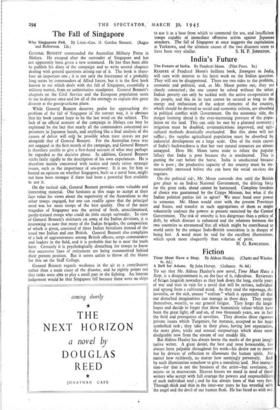The Fall of Singapore
GENERAL BENNETr commanded the Australian Military Force in Malaya. He escaped after the surrender of Singapore and has not apparently been given a new command. He has thus been able to publish his diary of the campaign and to write several chapters dealing with general questions arising out of it. The book is there- fore an important one ; it is not only the forerunner of a probably long series by commanders of Allied forces, but it is the first book known to me which deals with the fall of Singapore, essentially a military matter, from an authoritative standpoint. General Bennett's chapters on the Civil Service and the European population seem to me to dispose once and for all of the attempts to explain this great disaster at the gossip-column plane.
While General Bennett deserves praise for approaching the problem of the fall of Singapore in- the correct way, it is obvious that his book cannot hope to be the last word on the subject. The lack of an official account of the campaign in Malaya can best be explained by the fact that nearly all the commanders concerned are prisoners in Japanese hands' and anything like a final analysis of the causes of defeat will only be possible when trim stories are put alongside that of General Bennett. For the Australian force was not engaged in the first month of the campaign, and General Bennett is therefore unable to give a first-hand account of what may perhaps be regarded as the decisive phase. In addition, General Bennett sticks fairly rigidly to the description of his own experiences. He is therefore mainly concerned with tactics and rarely raises strategic issues, such as the importance of sea-power. It is noi for him to hazard an opinion on whether Singapore, built as a naval base, might not have been stronger if there had been a powerful fleet available to use it.
On the tactical side, General Bennett provides some valuable and interesting material. One hesitates at this stage to accept at their face value his views about the superiority of the Australians to the other troops engaged, but one can readily agree- that the principal need was for more troops of the best quality. One of the main tragedies of Singapore was the arrival of fresh, smacclimatised, partly-trained troops who could do little except surrender. In view of General Bennetes strictures on some of the Indian divisions, it is interesting to note that many of the Indian brigades, the composition of which is given, consisted of three Indian battalions instead of the usual two Indian and one British. General Bennett also complains of a lack of aggressiveness among British officers, corps commanders and leaders in the field, and it is probable that he is near the truth here. Certainly it is psychologically disturbing for troops to know that successive lines of retirement are being reconnoitred behind their present position. But it seems unfair to throw all the blame for this on the Staff College.
General Bennett regards weakness in the air as a contributory rather than a main cause of the disaster, and he rightly points out that tanks were able to play a small part in the fighting. An interim judgement would be that Singapore fell because there were no ships to use it as a base from which to command the sea, and insufficient troops capable of immediate offensive action against Japanese attackers. The fall of Singapore at once Suggests the capitulation at Yorktown, and the ultimate causes of the two disasters seem to






















 Previous page
Previous page